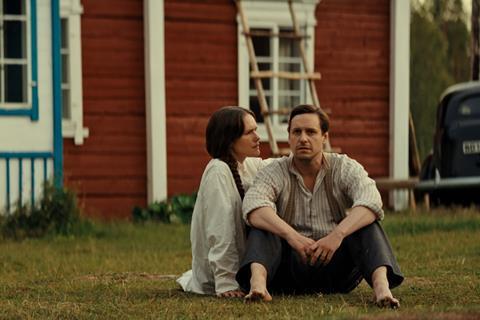Intense religious fervour brings fear to a 1930s Swedish village in Rotterdam’s Big Screen winner

Dir/scr. Jon Blahed. Sweden. 2025. 108mins
Schoolteacher Rakel (Jessica Grabowsky) is already an outsider in her community in the Torne Valley, in the far north of 1930s Sweden; she is one of the few villagers who speaks Swedish as well as the local language of Meankieli. Then she finds both her religious devotion and her duty to her husband Teodor (Jakob Ohrman) tested to breaking point. Teodor’s decision to start his own religious sect initially troubles her; as his doomsday prophecies and power abuses become increasingly extreme, she fears for her future and that of her step-daughter. Jon Blahed’s handsome period drama makes striking use of the wide, boundless northern horizons, while also building a sense of claustrophobic, oppressive tension and of minds slamming shut.
There is no denying the uncomfortable potency of the filmmaking
On paper, it seems like a niche proposition: a film inspired by the Korpela Movement, a controversial early 20th century spin off from the Lutherian church, which is the first picture to be made in the Meankieli language (officially recognised as a minority language in Sweden, it is spoken by an estimated 70,000 people in the country). But Raptures, which won the top prize in Rotterdam’s Big Screen Competition, taps into broader themes. It is a film about the rise of extremism within a community, addressing evils that are wrought by men (and it is almost always men) who believe that they have been chosen by God.
Director Blahed, who hails from the region in which the story unfolds, has previously explored aspects of contemporary life in the north of Sweden with other projects, such as Inland (2020) and Turpa Kiini Minun Haters (2019). This atmospheric period piece, which was inspired by the novel Dagning, röd! by Bengt Pohjanen, is a step up in terms of ambition which, buoyed by its IFFR win, should raise Blahed’s profile internationally.
We view the tight-knit community in the Meanmaa region through Rakel’s watchful eyes. She seeks out her husband’s gaze as they sit among the congregation of their community church. Teodor, as befits his status as one of the most prosperous and important of the villagers, sits apart from the rest of the worshippers, positioning himself shoulder to shoulder with the visiting preacher Toivo Korpela (Samuli Niittymaki). Rakel finds reassurance in Teodor’s beatific smile, but she sees a competitive element to the religious fervour of her fellow congregants, who compete for Korpela’s attention with showy displays of piety and devotion.
Grabowsky is excellent, bringing a conflicted complexity to her performance that is less evident elsewhere in the film. Blahed cast predominantly Finnish performers rather than Swedes because Meankieli is closer to the Finnish language than it is to Swedish, and had a fluent Meankieli speaker as a consultant. But an issue with making a picture in a language that none of the actors speak fluently is that the dialogue is delivered very much as written, meaning that it can feel a little declamatory and stilted at times.
However, there is no denying the uncomfortable potency of the filmmaking, with the score – combining grumbling harmonium base notes and rippling, fretful woodwind – a particular stand out. Rakel watches in horror as a collective madness takes hold in this austere, God-fearing community. Teodor’s splinter-group sect, started as a reaction to the perceived abandonment by their preacher, gathers followers. And Teodor, emboldened by the eager response to his end of days rhetoric (a flying ark, he decided, would descend from heaven to take 666 true believers to Palestine, in advance of the end of the world) starts to demand that his followers offer themselves up for sex rituals.
At the same time, Teodor follows the abuser’s playbook of isolating his wife from all but him: Rakel is forced to choose between her husband and her teaching job. For the sake of her step-daughter, she resigns from the school, but his abuses of the young women in what is looking increasingly like a cult persuades Rakel that neither she nor the child is safe within Teodor’s malign orbit.
Production companies: Iris Film AB, Rabbit Films, Filmpool Nord, SVT
International sales: Picture Tree International, pti@picturetree-international.com
Producers: Andreas Emanuelsson, Tony Osterholm
Cinematography: Mimmo Hilden
Production design: Vilja Katramo, Okku Rahikainen
Editing: Nina Ijas
Music: Rebekka Karijord
Main cast: Jessica Grabowsky, Jakob Ohrman, Samuli Niittymaki, Hannes Suominen, Rebekka Baer, Hannu-Pekka Bjorkman, Elina Knihtila, Alma Poysti, Anton Raukola















![[L-R]: Amanda Villavieja, Laia Casanovas, Yasmina Praderas](https://d1nslcd7m2225b.cloudfront.net/Pictures/274x183/6/4/1/1471641_pxl_20251224_103354743_618426_crop.jpg)








